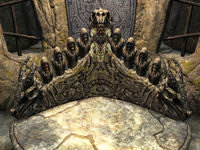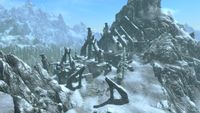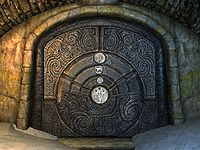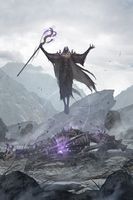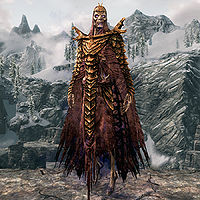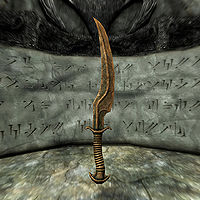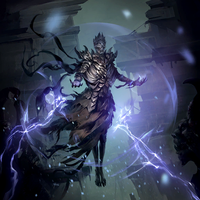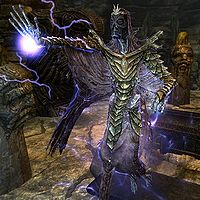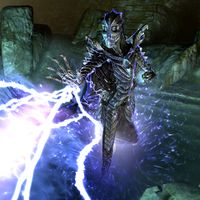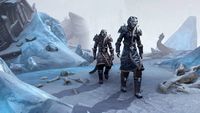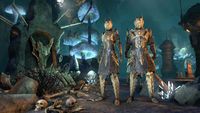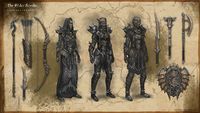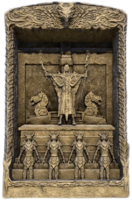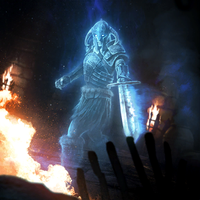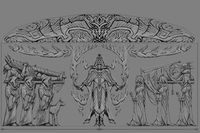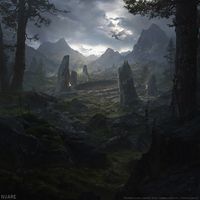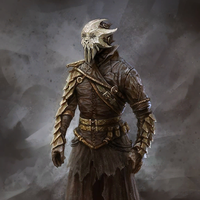Lore:Dragon Cult
The Dragon Cult (also known as the Atmoran Dragon Cult or Cult of the Dragon Priests)[1] began as a sect within the traditions of animal worship brought by Atmorans to Tamriel. Certain scholars believe these were "totem animals" for the modern Divines; in which case, worship of the dragon corresponded to worship of Akatosh. Dragons were revered more than any other, and they were comfortable in assuming positions as god-kings over men. Their servants, the dragon priests, kept the peace between dragons and men, and their power was so great that uttering any word for "dragon" was forbidden to all mankind except them. They made laws for the society of men, and were on par with kings. Grand temples were built to honor the dragons and appease them in life and death, many of which survive as draugr-infested ruins today.[2]
Some time during or soon after the migrations to Tamriel, the dragon cult began to assert more influence and become much more malevolent.[2] From their capital Bromjunaar in modern-day Hjaalmarch,[3] they ruled Skyrim with an iron fist, effectively enslaving the populace. While what led to this change was lost to historians,[2] it was likely caused by Alduin, the First-Born of Akatosh and leader of the dragons, who had chosen to forsake his role as World Eater in favor of conquering Mundus for himself.[4] Men eventually rebelled in the late Merethic Era, leading to the ancient Dragon War.[2]
Men, with the help of several dragons, eventually secured victory with the defeat of Alduin. The dragon priests were overthrown and dragons were slaughtered in large numbers before fleeing to remote areas. Though they had lost their god-kings and were cast out of mainstream Nordic society, the dragon cult managed to adapt and survive for centuries.[2] Whenever they could lay hands on the remains of a dragon, they would build a tomb for it known as a "dragon mound", a practice they maintained for centuries after the war.[2][5] They believed that one day the dragons would rise again and reward the faithful.[2]
When the priests of the Eight Divines arrived in Skyrim in the First Era, they found it very difficult to convert the Nords, in part because the Nords had abandoned the worship of the dragon along with the dragon cult. Thus, they only knew of the Great Dragon, Akatosh, as the elven god Auriel, whom they despised as a demon. The missionaries were able to allay some concerns by claiming that Alduin and those who followed him had acted against the wishes of Akatosh, and it was his intervention that led some dragons to assist men against their brethren. The dragon cult was eventually driven extinct, surviving only in the form of draugr who continue to prowl ancient ruins.[2] The last known holdouts were discovered and besieged in the monastery of Forelhost in the mountains of the Rift by the forces of High King Harald, eventually committing mass suicide in 1E 140.[6]
Temples[edit]
The Dragon Cult was known to have many great and elaborate temples devoted to the Dragons, with them stretching across Skyrim, Solstheim and even sections of Wrothgar. These temples were constructed in honor of the Dragon Priests, and often had effigies to animal gods such as the bear, dragon, fox, moth, owl, snake, whale, and wolf. These temples are guarded by draugr, where their Dragon Priest masters are entombed.[7] The temples of Skyrim often contained Dragon claw switch doors, which could only be unlocked with a corresponding claw, made of different materials such as ebony and gold.[8]
Gallery[edit]
Books[edit]
- The History of Zaan the Scalecaller by Jorvuld Davaux, Dragon Priest Historian — The short biography of a minor Dragon Priest
- The Dragon War by Torhal Bjorik — A religious text describing the primordial war between men and dragons
- Amongst the Draugr by Bernadette Bantien, College of Winterhold — Discoveries about the draugr and their link to the dragon cults
- Crafting Motif 59: Scalecaller Style by Jorvuld Davaux, Dragon Priest Historian — A guide to crafting armor and weapons in the Scalecaller style
- Temples of the Dragon Cult by Cirantille — A history of the Dragon Cult
- Draugr and the Dragon Cult by Dragon Cult Chronicler, Skormvnir Kyrrund — A plea to honor and cherish the draugr of Skyrim
See Also[edit]
- For game-specific information, see the Elder Scrolls Online article.
References[edit]
- ^ The Elder Scrolls V: Skyrim: Prima Official Game Guide — David Hodgson
- ^ a b c d e f g h The Dragon War — Torhal Bjorik
- ^ A Minor Maze
- ^ Paarthurnax's dialogue in Skyrim
- ^ Atlas of Dragons — Brother Mathnan
- ^ Skorm Snow-Strider's Journal — Skorm Snow-Strider
- ^ Temples of the Dragon Cult — Cirantille
- ^ The Golden Claw quest in Skyrim
|
|||||||||||||||||||||||||
|
||||||||||||||||||||||||||||||
